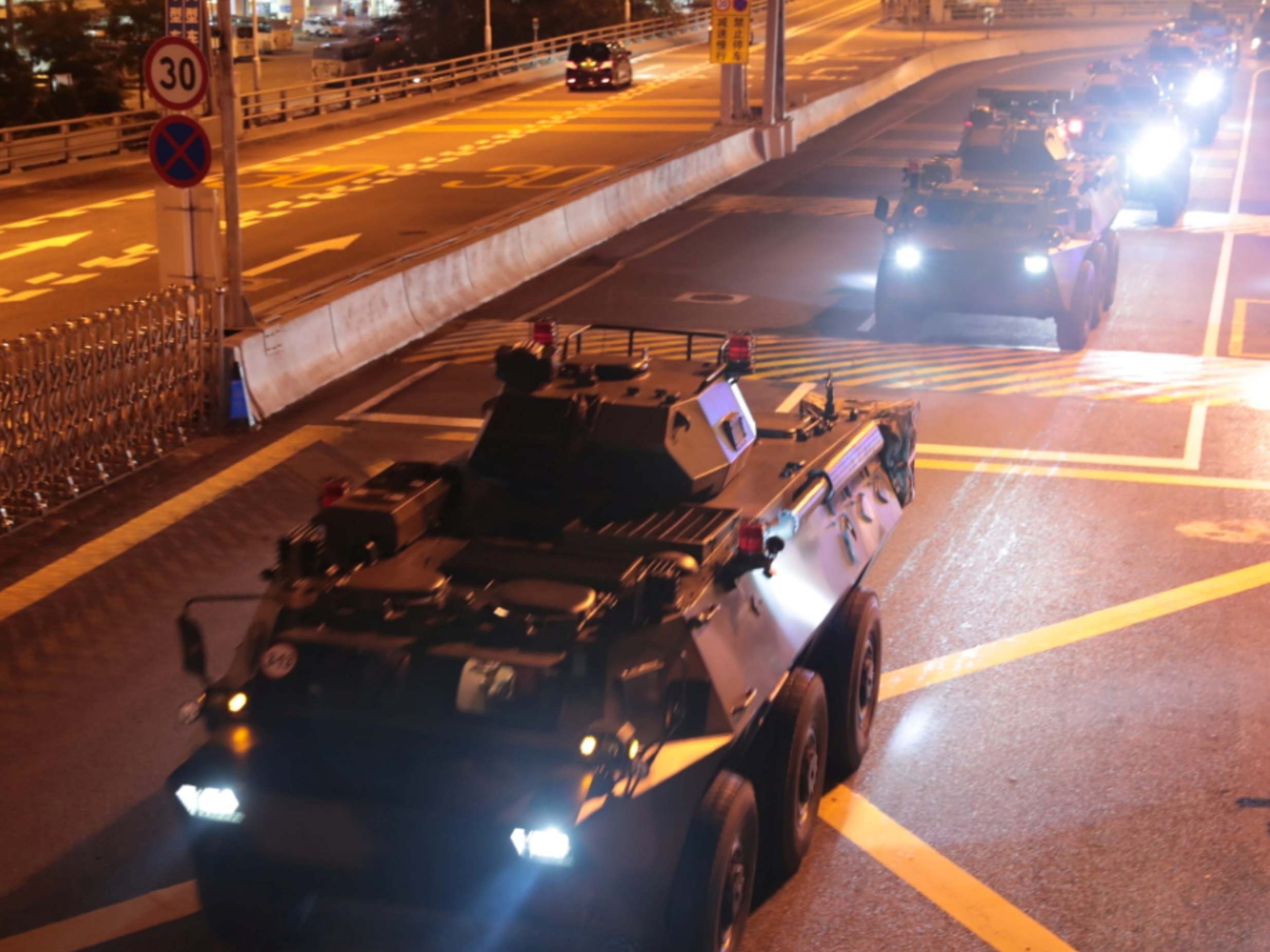Hong Kong alarmed as Chinese troops pour into city in what Beijing calls ‘routine’ troop rotation
Witnesses reported 3am convoy of armoured Chinese personnel carriers and trucks entering city

Your support helps us to tell the story
From reproductive rights to climate change to Big Tech, The Independent is on the ground when the story is developing. Whether it's investigating the financials of Elon Musk's pro-Trump PAC or producing our latest documentary, 'The A Word', which shines a light on the American women fighting for reproductive rights, we know how important it is to parse out the facts from the messaging.
At such a critical moment in US history, we need reporters on the ground. Your donation allows us to keep sending journalists to speak to both sides of the story.
The Independent is trusted by Americans across the entire political spectrum. And unlike many other quality news outlets, we choose not to lock Americans out of our reporting and analysis with paywalls. We believe quality journalism should be available to everyone, paid for by those who can afford it.
Your support makes all the difference.Thousands of Chinese troops streamed into Hong Kong in the small hours of Thursday morning, prompting alarmed witness reports after weeks of military intervention threats from Beijing amidst the city’s protest crisis.
Chinese state media later described the move as an “annual… routine” rotation of Hong Kong’s permanent garrison.
But the scenes of armoured carriers and trucks moving in convoy through the city streets, and the manner of the announcement in the official Xinhua news agency, led pro-democracy activists to call it yet another “warning” that China is willing to use force to bring the ongoing unrest to an end.
It is more than 80 days since protests began over a now-suspended extradition bill that would have made it easier for Hong Kong to deport criminal suspects to the mainland. The protests have spiralled into the biggest broad-based political challenge to Beijing’s rule since the city was handed back to China by Britain in 1997.
China has made clear in recent weeks that it considers a military intervention in the crisis a viable option, despite US warnings that it would risk a repeat of the 1989 Tiananmen Square massacre.
Xinhua quoted the People’s Liberation Army (PLA) as saying that a handover ceremony for the Hong Kong garrison was held overnight.
It quoted an army major as telling the newly stationed troops: “This time the task has a glorious mission. The responsibility is great. The job is difficult. The time for a true test has arrived.”
Xinhua said the soldiers in the new rotation were educated on Hong Kong’s laws and vowed to defend the nation’s sovereignty.
Liu Zhaohui, the garrison’s deputy chief of staff, said on the CCTV channel that the PLA would “firmly implement the guideline of ‘one country, two systems’” – the principle by which Hong Kong is considered a part of China but with an independent judiciary and certain democratic rights not enjoyed by those on the mainland.
Experts noted that, while the garrison change had indeed been expected, reports in Chinese media on the previous troop rotations in 2017 and 2018 made no reference to defending “one country, two systems”.
These previous notices also specified that the number of soldiers and amount of equipment in the Hong Kong garrison “was maintained with no change”. There was no such statement in Thursday’s announcement.
Dennis Kwok, an MP with the pro-democracy Civic party, questioned the timing and prominent Chinese media coverage of the troop movements.
“I believe this is a deliberate posture on the part of the PLA to tell or warn the Hong Kong people that it may be deployed,” he told public broadcaster RTHK.
“As I said time and again, the use of troops in Hong Kong will be the end of Hong Kong, and I would warn against any such move on the part of the central people’s government.”
Protest leaders are planning another major march for this coming Saturday, marking five years since Beijing announced it would pre-approve all candidates running for chief executive of the city in elections – effectively denying the people of Hong Kong universal suffrage.
Hundreds of thousands are expected to attend, despite police writing to organisers Civil Human Rights Front (CHRF) on Thursday refusing permission for the march. The group said it will appeal the decision.
On Wednesday night, protesters gathered to express anger at a specific issue they have with the conduct of the city’s police in recent weeks, raising allegations of what protest leader Joshua Wong called “sexual violence” towards female protesters.
The rally was billed as a #MeToo event, part of the global movement to raise awareness of sexual assault and harassment in diverse industries including cinema, politics and the media.
Women at the rally gave accounts of mistreatment by police officers during pro-democracy protests. One woman broke down in tears as she described being strip-searched, according to the South China Morning Post.
Another said officers had called her a “prostitute” as they dragged her away from a protest, with her dress upturned.
Hundreds of people have been detained over the course of the more than 11 weeks of protests. Hong Kong Police rejected the allegations, saying detainees were treated with dignity and that it had received no formal complaints.
Join our commenting forum
Join thought-provoking conversations, follow other Independent readers and see their replies
Comments